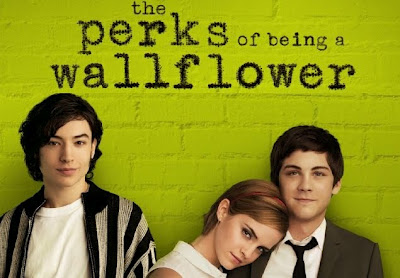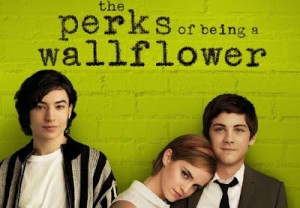The Perks of Being a Wallflower Are Not Available to Low-Income Latino Teens

I am an uncle to many nieces and nephews—too many to take on outings all at once. I sadly realize, also, that my life is too busy to take them out more. So last week, I invited my 11- and 13-year-old nieces to see The Perks of Being a Wallflower.
I sat next to them watching, promising myself I would not text or fall asleep. I couldn’t. I enjoyed the opening where Charlie, a freshman, is lonely in a high school of jocks and affluent Pennsylvania-area teens in the early 1990s (very early: the characters still make mix tapes). He sits alone at lunch. I heard my nieces laughing. “Good,” I thought. “This will help them see adolescent awkwardness (not that my nieces are awkward) and celebrate teenage transcendence.”
Then, Charlie befriends Patrick and his step-sister Sam who invite him to a party in a house with chandeliers. Charlie eats his first brownie with weed.
“Oh oh . . . maybe the girls won’t figure it out,” I hoped. Nope. The director made it clear Charlie is high. Damn.
All the misfits, who are seniors, love Charlie when he’s high. Later on, everyone loves Charlie when he casually trips on LSD. We’re happy Charlie is found New Year’s morning passed out in the snow and ends up in the hospital. “That’s good,” we think. “He’s safe.”
Of course he’s safe. He’s rich. He’s white. As long as on-screen characters are affluent, which usually means white, we see their irresponsible behavior as a life lesson we should learn. We’re OK when Ferris Bueller cuts school, when the Breakfast Club aggravates an educator, when the blond cheerleader ends up drunk with the freshman in Sixteen Candles.
During the LSD scenes in Wallflower, a man in the theater laughed loudly with chuckles that sounded like “Ahhhhhh . . . Ha! Ha! Ha! I remember what that was like!”
But if the characters are black, brown, poor (redundant on the silver screen), we keep saying, “How can he do that?” Or “He’s wasting his life!” Or “What kinds of parents do these kids have!”
In real life, we see the role of affluence, too. A few years ago, I got a call from an affluent dad asking me to change his daughter’s grade. She had not passed a technology and writing skills class (because the work was too easy for her, of course) and now that she had and F because she didn’t do any work, she would attend summer school instead of summer dance camp. “Can you please reconsider, Mr. Salazar?” At that moment, I understood this type of family involvement. Isn’t this what people say we need more of in urban schools? Parent engagement?
Throughout the movie, as Charlie started gaining more female attention, I kept telling myself, “It’s PG-13. It’s PG-13. No nudity.” Then I remembered that “13” means something else these days. Soon, Charlie’s on the sofa in another parentless house with chandeliers, drinking wine, and touching the new girlfriend’s breasts over her dress.
“Do you want more soda?” I asked so they would take their eyes off the screen.
“I’m OK. No thanks,” they said.
Thankfully, the writer made the girl’s parents come home early. I thought: “You see! Bad things! Bad behavior! They’re in trouble! Yes. They. Are!”
But Charlie escapes. The girl zips up her dress in time, I guess. Charlie’s even driven home by the senior in her own little car. He waves good night and goes to bed. He probably dreams.
I didn’t know the movie would eventually lead to Charlie revealing the trauma of sexual abuse with a suggested suicide attempt. “You broke the English teacher’s code, Salazar,” I told myself. I saw the movie before reading the book.
As most of us know, Charlie spends time at a hospital, gets therapy, and everything works out. Charlie’s breaking point came because of a sexual encounter with a Sam, the senior he’s had a crush on finally expresses her affection for him. We’re glad this girl made a move Charlie. We’re glad the movie suggests they slept together (I was grateful the scene faded out).
But what if Charlie had been a female freshman? But what if Sam had been a male senior? What if Charlie, now a female character, had been abused by an uncle instead of an aunt?
We wouldn’t leave the theater with a sense of peace. Would this movie even make it to theaters?
The perks of being a wallflower are only available to affluent teens in the cinematic world and, arguably, in the real one. The movie aims to convince us that all of this is a coming-of-age experience. Many online descriptions of the book use this same phrase. The movie pushes us to believe that if we let teenagers be themselves, if we let teen misfits relax with other misfit teens on weekend nights in affluent homes with drugs and wine under chandeliers, everything—everyone—will turn out fine. They all got into college, after all—good colleges, too.
This truth only works in affluent on-screen neighborhoods like Charlie’s and in the 80s movies of John Hughes. It may even work in affluent suburbs and neighborhoods around here.
Instead of forcing the conversation about the need for awareness and prevention of physical and sexual abuse, The Perks of Being a Wallflower silences us. We leave the theaters with the idea that has allowed so many teens to hurt themselves and others: “They’re just being teenagers. They’ll be fine.”
On the drive home, I kept changing that radio as my nieces rode in the back seat. A Rihanna song came on. Change. Some sexy reggaeton song. Change. I put on my Sting CD. “Where’s the damn smooth jazz station when you need it?”
I knew my nieces didn’t want to have philosophical conversations with their uncle. So I fell into my awkward adult default social skills:
“Who was your favorite character, m’ija?”
“Who made you laugh the most?”
“You want a cheeseburger?”
We drove the 25 minutes home in silence, except for my singing, which caused quiet giggles.
Two blocks before I dropped them off I said what I felt I needed to say really fast: “Noboyfriendorfriendshouldeverhityouormistreatyou. Youletmeknowifanyonedoes.”
Then . . . I forced . . . myself . . .to calm . . . down.
“And no one—no one—can ever touch your private parts. If anyone ever tries, if anyone ever makes you feel weird, you let me know. I love you. Goodbye.”
They got out of the car and I drove away, satisfied, perhaps selfishly, I had said something to my nieces who are 11 and 13.
[Photo courtesy Summit Entertainment]

